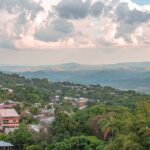In the heart of Mexico’s idyllic Sierra Gorda region, the smell of gorditas wafts from a small roadside eatery. Barro (“mud”) walls of earth trap warmth in winter, and locals and tourists fill the cozy space. Viviana Aguas Monroy, the eatery’s owner and head chef, is in the kitchen preparing more quesadillas and bean stew than ever before. Business has kicked into high gear since she received funding that allowed her to renovate her restaurant.
Viviana’s eatery, Fonda La Cabaña, is one of a dozen along Sierra Gorda’s Ruta de Sabor (“flavor route”), an initiative created by nonprofit Grupo Ecologico Sierra Gorda (GESG) to help transform small restaurants into thriving businesses. GESG boosts local economies and conservation efforts in the Sierra Gorda in Central Mexico. The organization empowers many women-run enterprises in rural communities to incorporate environmentally sustainable options like composting toilets and walls made of barro to cut costs while benefitting the diverse ecosystems around it.
GESG’s work is an example of a holistic land management approach called integrated landscape management (ILM), which aims to boost individual, community and environmental well-being. Practitioners applying ILM seek to make land-use decisions that promote soil health, ecosystem recovery, local economic growth, and measurable financial gain for small-business owners.
Collaboration is key
Designing sustainable solutions through collaboration among locals and outside parties is crucial to making long-lasting change. Landscape partnerships like GESG bring together the voices of policymakers who make rules about land use; community land owners who could benefit from adopting new sustainable business methods, such as eco-tourism or agroforestry; and residents who also use the land for recreational, cultural and religious pursuits. Sierra Gorda’s Ruta de Sabor is a shining example of ILM. It illustrates how collaboratively investing in small-scale actors reaps benefits for individuals, the economy, and the planet.
“I feel very proud because Señora Pati [GESG cofounder] gave us building materials, publicity, and support in many ways,” said Aguas Monroy. “Pati has given great opportunities to so many women on the Ruta de Sabor.”
1000L co-lead EcoAgriculture Partners is an advocate for GESG’s work and implementing ILM globally. The international nonprofit, which creates sustainable development and conservation solutions, works at the scale of landscapes. These cohesive regions, like the one home to GESG, are tied together by the interconnected human activities and natural processes within them. EcoAg’s founder, Dr. Sara Scherr, emphasizes the incredible economic opportunity ILM offers land owners and investors. “There’s a tendency in the current system to have a winner-takes-all approach,” she said. “A landscape approach, as an alternative, focuses on jointly designed strategies for adapting to climate change and economic growth to find win-win solutions.”
By widening the lens of what the business world considers to be “success” past that of only short-term financial gains, the value of investing in longer-term, sustainability-focused solutions becomes clear. Investors, land owners, employees and communities can thrive together if they find common ground on supporting small-scale actors within landscapes. That, said Scherr, is the power of ILM.
Continue reading the story here.
—–
The full story was originally posted on February 1st, 2024, as part of Forbes EQ BrandVoice, a partnership spotlighting organizations championing representation, inclusion & systemic equity.


